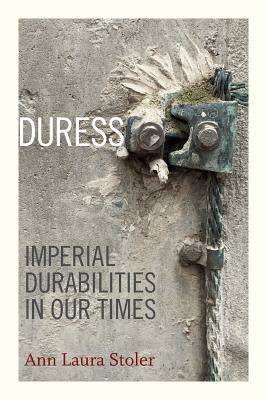
- Afhalen na 1 uur in een winkel met voorraad
- Gratis thuislevering in België vanaf € 30
- Ruim aanbod met 7 miljoen producten
- Afhalen na 1 uur in een winkel met voorraad
- Gratis thuislevering in België vanaf € 30
- Ruim aanbod met 7 miljoen producten
Zoeken
Omschrijving
How do colonial histories matter to the urgencies and conditions of our current world? How have those histories so often been rendered as leftovers, as "legacies" of a dead past rather than as active and violating forces in the world today? With precision and clarity, Ann Laura Stoler argues that recognizing "colonial presence" may have as much to do with how the connections between colonial histories and the present are expected to look as it does with how they are expected to be. In Duress, Stoler considers what methodological renovations might serve to write histories that yield neither to smooth continuities nor to abrupt epochal breaks. Capturing the uneven, recursive qualities of the visions and practices that imperial formations have animated, Stoler works through a set of conceptual and concrete reconsiderations that locate the political effects and practices that imperial projects produce: occluded histories, gradated sovereignties, affective security regimes, "new" racisms, bodily exposures, active debris, and carceral archipelagos of colony and camp that carve out the distribution of inequities and deep fault lines of duress today.
Specificaties
Betrokkenen
- Auteur(s):
- Uitgeverij:
Inhoud
- Aantal bladzijden:
- 448
- Taal:
- Engels
- Reeks:
Eigenschappen
- Productcode (EAN):
- 9780822362524
- Verschijningsdatum:
- 4/11/2016
- Uitvoering:
- Hardcover
- Formaat:
- Genaaid
- Afmetingen:
- 160 mm x 241 mm
- Gewicht:
- 793 g

Alleen bij Standaard Boekhandel
+ 386 punten op je klantenkaart van Standaard Boekhandel
Beoordelingen
We publiceren alleen reviews die voldoen aan de voorwaarden voor reviews. Bekijk onze voorwaarden voor reviews.











